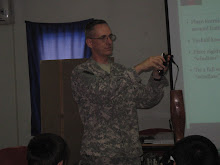I got back to Camp Spann the two nights ago. It was so nice to sleep in my own B Hut and cot. It is good to be back.
Today let's examine two words used widely in the discussions of Afghanistan. My Interpreter enlightened me as to their meaning.
Hazara هزاره
The word in Dari for 1000 is hazaar. When the Mongols brutally invaded Afghanistan in the Middle Ages timeframe, a subset of these warriors chose to settle in the central mountainous part of Afghanistan. The Khan reportedly allowed it, as long as they settled in groups of 1000, as it was the standard number for a Mongol military unit. Like many names of ethnic peoples, it is not a name they chose for themselves, but rather were given by those around them. They are a predominantly Shia Muslim people in a Sunni country. Thus you can see there are several reasons why the other ethnic groups: Pashtu, Tajik and Uzbek have long seated traditional dislike for the Hazara.
Pakistan پاکِستان

We are all aware that Pakistan is the country south of Afghanistan. It was formed as a muslim state during the fractured Independence of Colonial India from the UK. The Dari and Urdu work for clean is Pok. Pokistan, then is the country of the 'clean' people. I doubt the founders meant clean as in the physical sense, since that is almost impossible in this part of the world I fear. They chose the name to separate themselves as the spiritually clean (muslim) population. It is an interesting choice of words.
I must say for all the books I have read on the region, this type of education on the root meaning of words and names only comes from learning from the people of this country directly.





















 It seems that every roundabout in Mazar e Shariff has a different and bizarre motiff. The next one past the globe(above) is one that looks like a birthday cake with large plastic candles. There are others with large bronze statues or space age structures in the middle. At times you may see people napping in the grass or even a herd of goats eating the well watered grass.
It seems that every roundabout in Mazar e Shariff has a different and bizarre motiff. The next one past the globe(above) is one that looks like a birthday cake with large plastic candles. There are others with large bronze statues or space age structures in the middle. At times you may see people napping in the grass or even a herd of goats eating the well watered grass. 








 that we are dictating how the Afghans set up and run their health system- "first remove the log from your own eye, then you will be better able to see the speck in your brothers eye"- a famous quote comes to mind. Perhaps there are things we can learn from Afghanistan.
that we are dictating how the Afghans set up and run their health system- "first remove the log from your own eye, then you will be better able to see the speck in your brothers eye"- a famous quote comes to mind. Perhaps there are things we can learn from Afghanistan.